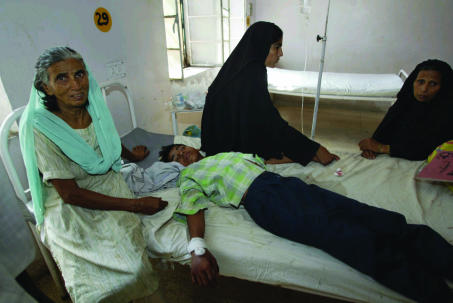India is battling an unprecedented epidemic of chikungunya, an uncommon viral fever spread by mosquito bites.
Figure 1.
A mother sits beside her son, who is suspected of having dengue haemorrhagic fever, in Allahabad, India
Credit: RAJESH KUMAR SINGH/AP/EMPICS
It is thought that more than 1.3 million people across southern and central India have been infected. Meanwhile a simultaneous outbreak of dengue haemorrhagic fever, spread by the same species of mosquito, has affected 3600 people and killed 48 in several states.
Doctors say that India's weak mechanisms for disease surveillance and a steady deterioration of public health services across the country can be blamed for the resurgence of the two viral infections, transmitted by the Aedes aegypti mosquito.
The health ministry said earlier this week that more than 1.3 million people in 10 states had suspected chikungunya, typical symptoms of which are high fever and arthralgia, but that the infection had been serologically confirmed in only 1533 people. A health official said the ministry is also investigating the deaths of some patients with chikungunya who had developed secondary complications such as encephalitis and renal failure.
Some virologists have attributed the fast geographical spread of chikungunya within a period of 12 months to its sudden re-emergence in India after 32 years. “Much of India's population today has never been exposed to the virus,” said a researcher at the National Institute of Virology. “But this virus also appears to grow unusually fast in the laboratory, and there might be other factors that have fuelled its spread. We don't know yet,” she said.
Meanwhile, health officials are trying to allay panic over the latest outbreak of dengue, which the health ministry says has killed 20 people in New Delhi, including a medical student, as well as eight people in the state of Rajasthan and 20 in other states.
The national vector-borne disease control programme has recorded only 3407 cases of dengue so far this year, whereas the figures were 12 754 in 2003 and 11 985 last year. But doctors warn that the outbreak might last until winter, when the breeding rates of Aedes aegypti fall.
Doctors have said that the resurgence of the infections highlights the health authorities' failure to pick up warning signals and civic authorities' inability to control mosquito breeding.
“Our public health system has broken down,” said Kunchala Shyamprasad, a member of a government task force on medical education.
“This is the result of a focus on curative medicine and a steady shift away from preventive public health,” Dr Shyamprasad said. “These outbreaks should serve as a wake-up call. India needs a public health act that will make it mandatory for states to address issues such as sanitation and prevention through regular mosquito surveillance,” he said.
Supplementary Material
 Longer versions of these articles are on bmj.com
Longer versions of these articles are on bmj.com
Associated Data
This section collects any data citations, data availability statements, or supplementary materials included in this article.



